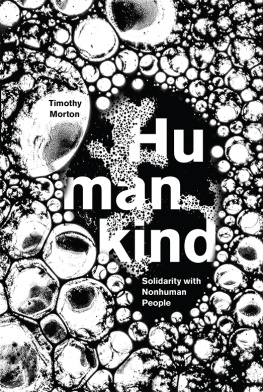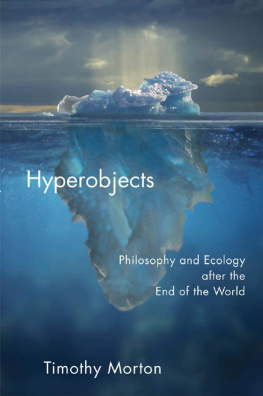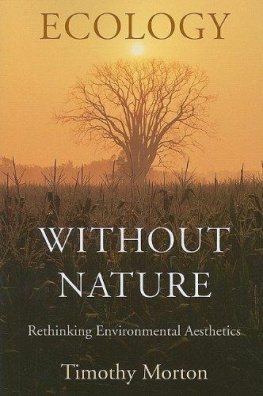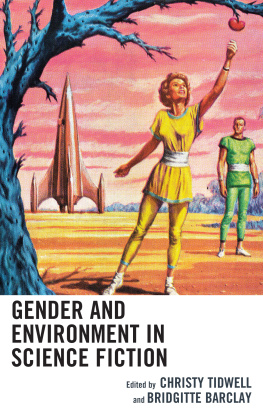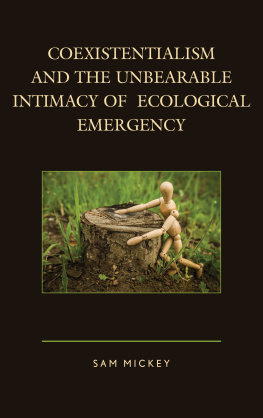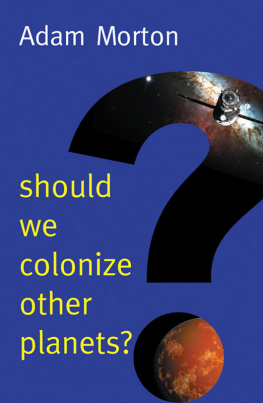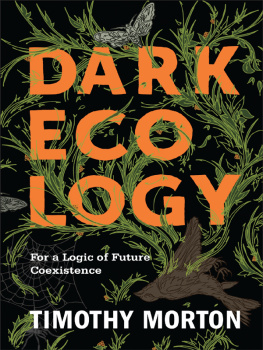Names: Morton, Timothy, 1968- author.
Title: Humankind / Timothy Morton.
Description: Brooklyn : Verso Books, 2017. | Includes bibliographical references and index. |
Identifiers: LCCN 2017011128 (print) | LCCN 2017024047 (ebook) | ISBN 9781786631336 () | ISBN 9781786631329 (hardback : alk. paper)
Subjects: LCSH: Philosophical anthropology. | Human beings. | Animals (Philosophy) | Human-animal relationships.
I would like to thank my editor Federico Campagna for his brilliant insight and aid. Federico caused such deep and positive changes to my writing that I will be forever in his debt.
My research assistants Kevin MacDonnell and Randi Mihajlovic worked tirelessly helping me to finish the manuscript. Beyond this, Kevin has been my assistant for two years now and my scholarly life is so much better for it. Thank you, Kevin, for everything.
Nicolas Shumway, Dean of Humanities at Rice, deserves a special mention for his untiring belief in what I do. Im forever in his debt.
So many people shared thoughts and suggestions, kindness and support. Among them were Blaise Agera y Arcas, Heitham Al-Sayed, Ian Balfour, Andrew Battaglia, Anna Bernagozzi, Daniel Birnbaum, Ian Bogost, Tanya Bonakdar, Marcus Boon, Dominic Boyer, David Brooks, Alex Cecchetti, Stephen Cairns, Eric Cazdyn, Ian Cheng, Kari Conte, Carolyn Deby, Nigel Clark, Juliana Cope, Laura Copelin, Annie Culver, Sarah Ellenzweig, Olafur Eliasson, Anna Engberg, Jane Farver, Dirk Felleman, Joo Florncio, Mark Foster Gage, Peter Gershon, Hazel Gibson, Jga Jhannsdttir, Jn Gnarr, Kathelin Gray, Sofie Grettve, Lizzy Grindy, Bjrk Gumundsdttir, Zora Hamsa, Graham Harman, Rosemary Hennessy, Erich Hrl, Emily Houlik-Ritchey, Cymene Howe, Edouard Isar, Luke Jones, Toby Kamps, Greg Lindquist, Annie Lowe, Ingrid Luquet-Gad, Karsten Lund, Boyan Manchev, Kenric McDowell, Tracy Moore, Rick Muller, Jean-Luc Nancy, Judy Natal, Patricia Noxolo, Hans Ulrich Obrist, Genesis P-Orridge, Solveig vsteb, Andrea Pagnes, Albert Pope, Asad Raza, Alexander Regier, Ben Rivers, Judith Roof, David Ruy, Mark Schmanko, Sabrina Scott, Nicolas Shumway, Solveig Sigurardttir, Emilija karnulyt, Gayatri Spivak, Haim Steinbach, Verena Stenke, Samuel Stoeltje, Susan Sutton, Jeff VanderMeer, Lucas van der Velden, Teodora Vikstrom, Jennifer Walshe, Sarah Whiting, Clint Wilson, Tom Wiscombe, Susanne Witzgall, Cary Wolfe, Annette Wolfsberger, Hyesoo Woo, Martyn Woodward, Els Woudstra and Jonas ukauskas.
And a big thank you to everyone who showed up to classes and lectures in the last two years. Talking with you is my lab, and theres no way I could know what I know now without you.
Over the years its become clear that if it wasnt for my many encounters with Jarrod Fowler, I probably wouldnt have written very much; once again Im beyond grateful to him for his relentless downloading of conceptual quartz crystal powder into something like my head. This book is indebted to the thought of my firned Jeffrey Kripal, whose work on the paranormal and the sacred sparked many thoughts.
While I was writing this book, indigenous people and non-indigenous people in solidarity with them were struggling against the militarized forces of petroculture to prevent the Dakota Access Pipeline in the United States from destroying people of all kinds, whether human or not. They call themselves the Water Protectors. This book is dedicated to them.
There was a time when men imagined the Earth as the center of the universe. The stars, large and small, they believed were created merely for their delectation. It was their vain conception that a supreme being, weary of solitude, had manufactured a giant toy and put them into possession of it
Man issued from the womb of Mother Earth, but he knew it not, nor recognized her, to whom he owed his life. In his egotism he sought an explanation of himself in the infinite, and out of his efforts there arose the dreary doctrine that he was not related to the Earth, that she was but a temporary resting place for his scornful feet and that she held nothing for him but temptation to degrade himself.
Emma Goldman and Max Baginski, Mother Earth
Gosh, youve really got some nice toys here.
Replicant Roy, Blade Runner (Ridley Scott, dir.)
Whoever severs himself from Mother Earth and her flowing sources of life goes into exile.
Emma Goldman
A specter is haunting the specter of communism: the specter of the nonhuman.
Humankind will argue that the human species is a viable and vital category for thinking communist politics, a politics that this book takes not simply to be international in scope, but planetary. By this is meant that communism only works when its economic models are thought as an attunement to the fact of living in a biosphere, a fact that I call the symbiotic real.
The symbiotic real is a weird implosive whole in which entities are related in a non-total, ragged way. (Ill be defining implosive holism throughout.) In symbiosis, its unclear which is the top symbiont, and the relationship between the beings is jagged, incomplete. Am I simply a vehicle for the numerous bacteria that inhabit my microbiome? Or are they hosting me? Who is the host and who is the parasite? The term host stems from the Latin hostis, a word that can mean both friend and enemy.
Fully one-third of human milk, for instance, is not digestible by the baby; instead it feeds bacteria that coat the intestines with The loose connectivity of the symbiotic real affects other orders of being, such as language. The opening and closing of suckling mammalian lips around the nipple makes an /m/ sound that is surely the basis of words such as mamma. Such words are roughly shared by nonhuman mammals, such as cats, whose meows also evoke this action, a sign they learn to use more frequently as adults when they live with humans.
Relying-on is the uneasy fuel of the symbiotic real; this relying-on always has its haunted aspect, so that a symbiont can become toxic or strange-seeming relationships can form, which is how evolution works. The right word to describe this reliance between discrete yet deeply interrelated beings is solidarity. Without the tattered incompletion of the symbiotic real at every scale, solidarity would have no meaning. Solidarity is possible and widely available because it is

